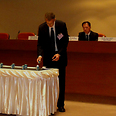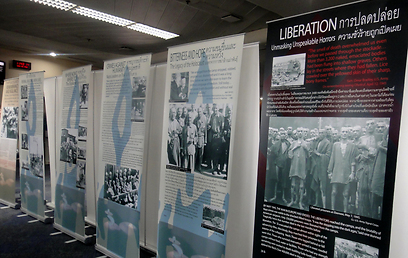
Thailand remembers Holocaust victims
International Holocaust Memorial Day marked in Bangkok. Education minister to consider including Shoah education in Thai school curriculum
The annual event commemorates the lives of 11 million victims who perished at the hands of the Nazi regime during WWII. The millions of people deemed undesirable by the Nazis included six million Jews and five million Gypsies, Poles and other Slavs, people with physical or mental disabilities, Jehovah's Witnesses, homosexuals, the dissenting clergy, communists, socialists, asocials, and other political enemies.
Harnessing hope and optimism as the time-proven keys to survival and revival, this year’s remembrance theme was entitled “Rescue during the Holocaust, The Courage to Care” and focused on celebrating those few courageous people who risked their lives to rescue victims from the clutches of death.
This year’s event illuminated those small flickers of light in a dark and ominous era, and serves to teach the lessons of the Holocaust in today’s world.
The official date of the UN International Day of Commemoration in Memory of the Victims of the Holocaust is January 27 and was chosen by the UN to mark the anniversary of the liberation of the Auschwitz-Birkenau extermination camp in 1945.
Following the declaration in 2005, the UN urged member states to develop localized educational programs in order to impart the memory of the Holocaust to future generations. The UN determined that by instilling awareness of historical facts, foment of hatred, racism and xenophobia, and ultimately crimes against humanity, could be prevented.
Eighteen governments legislated January 27 as the annual Holocaust Memorial Day, a day in which they examine the past in an attempt to better the future of their respective societies.
Universal lessons
The event was jointly organized by the UN Economic and Social Commission for Asia and the Pacific, and the Embassy of Israel.
Israeli Ambassador to Thailand Simon Roded spoke of the need for humankind to fight the impulse of switching channels and shrouding itself in false comfort when seeing disturbing images and the suffering of others, and urged to resist injustice, intolerance and indifference to prevent and end atrocities such as those that took place in Cambodia and Rwanda or those taking place in Syria today.
“Hitler was able to carry out his plans because too many good men decided to turn their heads, to look the other way, to distance themselves from the pain and suffering of their neighbors,” he said.
Roded added that the hands of time are threatening to cloud the world’s memory and that responsibility to teach the values of tolerance and to educate our children rests on our shoulders.
“We must apply the universal lessons of the Holocaust to today’s world. This means we have to educate our children to understand and to accept differences, to denounce atrocities and to respect human dignity.”

Holocaust exhibition in English and Thai (Photo: Embassy of Israel, Bangkok)
A screening of a personalized video message sent by UN Secretary-General Ban Ki-moon lent the occasion a sense of eminent stateliness. And in keeping with this year's theme, “Rescue during the Holocaust, the Courage to Care," the secretary-general celebrated the memory of the unsung heroes who defied all odds by saving human lives at the risk of losing their own.
He said the UN has produced educational packages to be taught in classrooms around the world in order to prevent such a tragedy from occurring again.
“Rescue during the Holocaust, the Courage to Care" commemorates names such as Raoul Wallenberg, a Swedish special envoy who rescued 100,000 Hungarian Jews, and Chiune Sugihara, a Japanese vice-consul stationed in Kaunas, Lithuania from 1939 to 1940. Sugihara risked his career, future and family’s life to save the lives of more than 6,000 Jews by defying his government’s orders and issuing transit visas for refugees to leave the country.
Chiune Sugihara’s grandson, Chihiro Sugihara, was present at the ceremony as a special guest speaker to tell of his grandfather’s selfless act which resulted in the second largest number of Jews being rescued from the Nazi regime.
In 1984, Israel`s Holocaust Memorial Authority, Yad Vashem granted Chiune Sugihara Israel`s highest honor, the title of “Righteous Among the Nations." It is estimated that more than 80,000 descendants owe their existence to Sugihara today.
Rabbi Abraham Cooper, associate dean of the Simon Wiesenthal Center, came especially to Thailand to give his keynote address entitled: "Lessons from the Holocaust for Asia."
He spoke of the ignorant use of Nazi symbols by Catholic school children in Chiang Mai, t-shirts and jeans adorned with Nazi swastikas worn by the young in newly democratized Myanmar, and India where young businessmen purchase the book "Mein Kampf”, as they have been told it is the product of a highly organized mind. Embracing these symbols and the horrors they represent will ultimately inspire intimidation of minorities and hate crimes, he said.
Quoting the late Simon Wiesenthal from the Simon Wiesenthal Center when asked if the Holocaust could happen again, his reply was yes, if three conditions exist: Hate, technology and government crisis.
Traveling exhibition
Dr. Sombat Suwanpitak, deputy permanent secretary of the Thai Ministry of Education, spoke on behalf of Minister Phongthep Thepkanjana, noting that it was important to look back at history to make the future a better place. The minister has agreed to consider including Holocaust education in the Thai school curriculum.
Bearing witness to his nation’s past, German Ambassador to Thailand Rolf Peter Gottfried Schulze expressed his government's obligation that racism, xenophobia and anti-Semitism will never again take hold in his country Germany, and in Europe. He quoted Chancellor Merkel, who asked: “How can we assume historical responsibility when the generation who survived the Holocaust will no longer be with us? The answer is obvious: The foundations of the future are built on the acceptance of Germany’s past.
"Only if we assume the everlasting responsibility for the Holocaust will we be able to ensure a human future. The key of assuming this responsibility lies in everyday life.”
A moving rendition of “Imagine” by John Lennon was sung by the young students from the Mechai Pattana Bamboo School, and gifted violinist Jonathan Glonek and the pianist Usa Napawan played an evocative and eerie piece entitled “Vidui” by Ernest Bloch, followed by “Hebrew Melody” by Josef Achron.
An accompanying exhibition entitled “The Courage to Remember” from the Museum of Tolerance, Los Angeles, was also translated into Thai, and the sequence of the horrors that took place during the Nazi era was clearly conveyed to all.
This traveling exhibition, by the educational branch of the Simon Wiesenthal Center, ties the past and present, teaching the dangerous and destructive impact of ignorance, hate and intolerance on individuals, communities and nations.
The event ended with attendees from all nations silently lining up, each in turn reading out a single name, place of birth, age and place of death of one person who perished during that dark era. Eleven candles, representing 11 million victims, were lit in their memory.










